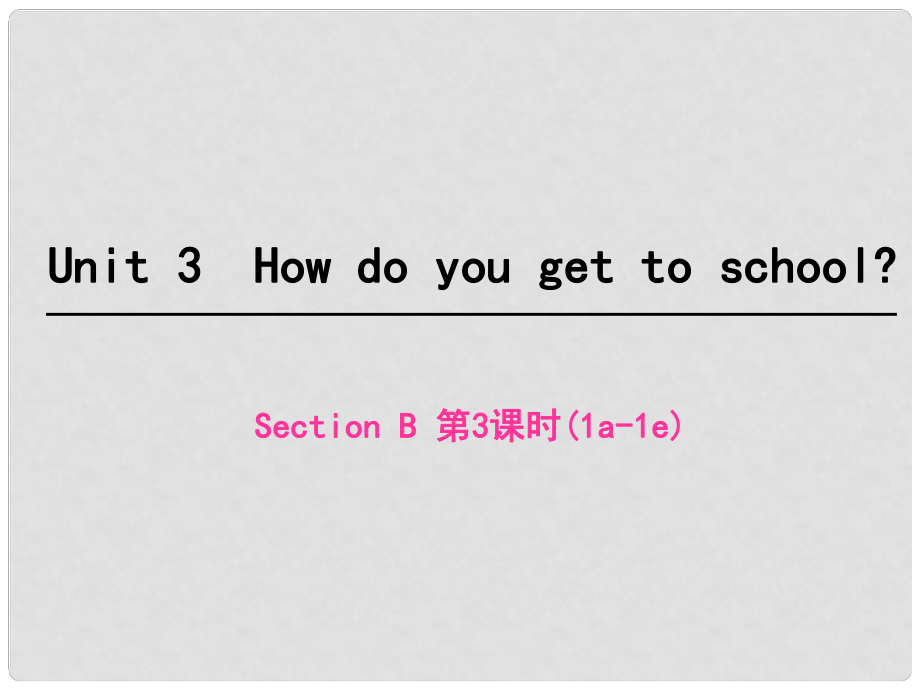《七年級(jí)英語(yǔ)下冊(cè) Unit 3 How do you get to school Section B(第3課時(shí))課件 (新版)人教新目標(biāo)版》由會(huì)員分享��,可在線閱讀�����,更多相關(guān)《七年級(jí)英語(yǔ)下冊(cè) Unit 3 How do you get to school Section B(第3課時(shí))課件 (新版)人教新目標(biāo)版(23頁(yè)珍藏版)》請(qǐng)?jiān)谘b配圖網(wǎng)上搜索��。
1��、Unit 3 How do you get to school?Unit 3 How do you get to school?Section B Section B 第第3 3課時(shí)課時(shí)(1a-1e)(1a-1e) How do you get to school?by bike / ride a bikeby bus /take the busby traintake the trainWhat is it?bus stopbus stationsubway stationtrain station1. _ bus stop 3. _ bus station2. _ train statio
2�����、n 4. _ subway stationbcad Match the words with the picture1aTell your partner how you get to school.Imagine you use two types of transportation.1bHow do you get to school?I ride a bike to the bus stop.Then I take the bus to school.How do you get to school?I take a bus to the subway station.Then I ta
3��、ke the subway.The subway station is crowed,and I spend five munites to get out of there.Listen and check () the things that Mary wants to know? Mary wants to know where Bob lives. how far he lives from his grandparentshome. how he gets to his grandparents home. how long it takes to get to his grandp
4��、arentshome what he thinks of the trip.1c12Listen again. How does Bob get to his grandparents home? Check () 1 or 2 1dTalk about how Bob gets to his grandparents home. 1eA: HOW DOES GRANDPA GET TO THE PARK?B: FIRST, HE TO C: NEXT, HE TO D: FINALLY HE How does Bobget to his grandparents home?He walks
5�����、to bus stop.Then he takes a bus to the train station.Finaly , his grandfather takes the subway to pick him up.First, he walks to the bus stop.Next, he takes the bus to the train station.Finally, he was picked to grandparents home.含賓語(yǔ)從句的主從復(fù)合句含賓語(yǔ)從句的主從復(fù)合句1.Mary wants to know what he thinks of the trip.
6���、 賓語(yǔ)從句三要素:賓語(yǔ)從句三要素:合適的連結(jié)詞�����;合適的連結(jié)詞�;陳述句陳述句語(yǔ)序語(yǔ)序�����;主從時(shí)態(tài)一致��。;主從時(shí)態(tài)一致��。常用句型常用句型 : What does / do sb think of = How do/does sb like 認(rèn)為認(rèn)為怎么樣���?怎么樣��?(常用來(lái)詢問(wèn)某人對(duì)某事(常用來(lái)詢問(wèn)某人對(duì)某事物的看法)物的看法)Language points2.stop的用法的用法(1) 作作動(dòng)詞動(dòng)詞�,意為����,意為“停止停止”,常用短語(yǔ):�����,常用短語(yǔ):stop doing sth.停止做某事���;停止做某事���;stop to do sth.停下來(lái)做某事���。停下來(lái)做某事���。如:如:You must stop smok
7���、ing. 你必須停止吸煙。你必須停止吸煙���。You must stop to have a rest.你必須停下來(lái)休息一下�����。你必須停下來(lái)休息一下���。(2)作作名詞名詞,意為����,意為“車(chē)站車(chē)站”。如:如:bus stop 公共汽車(chē)站公共汽車(chē)站注:注:bus stop指中途?���?空局钢型就?空?bus station指終點(diǎn)站指終點(diǎn)站2. What he thinks of the trip.” (1)think of意為意為“想起�,認(rèn)為,想起��,認(rèn)為,覺(jué)得覺(jué)得”���,常與�����,常與what連用�����,連用����,是用來(lái)是用來(lái)詢問(wèn)對(duì)某人(物)的看法詢問(wèn)對(duì)某人(物)的看法����。如:如:I want to know what she t
8、hinks of the movies.我想知道我想知道她對(duì)這部電影的看法是怎樣的�����。她對(duì)這部電影的看法是怎樣的����。(2)常見(jiàn)的回答有兩種方式:)常見(jiàn)的回答有兩種方式:表達(dá)自己的態(tài)度。表達(dá)自己的態(tài)度�����。如:如:I (dont) like it.說(shuō)明事物或人本身的特點(diǎn)�����。說(shuō)明事物或人本身的特點(diǎn)����。如:如:Its great. / Its too bad. 小結(jié)訓(xùn)練小結(jié)訓(xùn)練1. -Can you watch TV _ dinner? -No, but I can do it after dinner. A. for B. after C. before D. on2. -Why are you walking so fast? - Because I _ get home to do my work. A. have B. go to C. have to D. has toCC3. -Can you cook dinner? - _. Its easy. A. No, I cant B. Yes, I can C. No, I can D. Yes, I need4. I cant watch TV _ my school nights. A. on B. at C. in D. toBA完成當(dāng)堂測(cè)評(píng)作業(yè)完成當(dāng)堂測(cè)評(píng)作業(yè). .
 七年級(jí)英語(yǔ)下冊(cè) Unit 3 How do you get to school Section B(第3課時(shí))課件 (新版)人教新目標(biāo)版
七年級(jí)英語(yǔ)下冊(cè) Unit 3 How do you get to school Section B(第3課時(shí))課件 (新版)人教新目標(biāo)版

